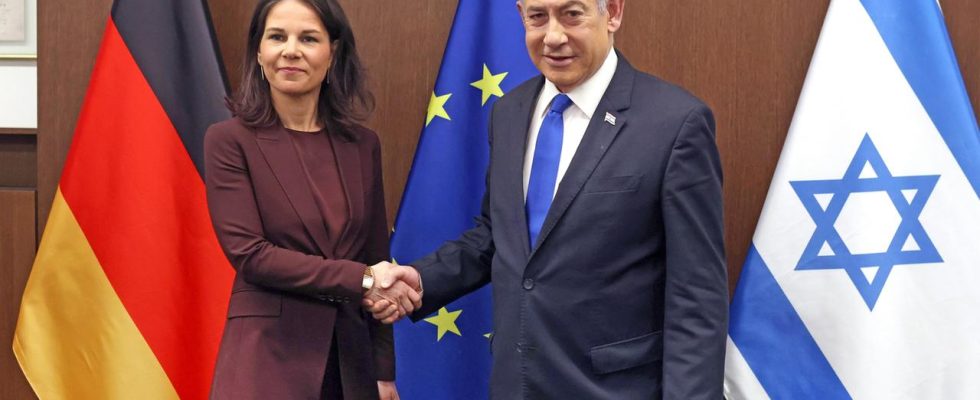After the Iranian attack on Israel, Federal Foreign Minister Baerbock is on constant diplomatic mission: In Jerusalem she warned again of an “escalation spiral”. But the decision to strike back has apparently already been made.
Crisis diplomacy in the Middle East, again. This time Annalena Baerbock, the German Foreign Minister, is traveling in close coordination with David Cameron, her British counterpart. Together they met Israel’s President Herzog. Baerbock later had talks with Israeli Prime Minister Benjamin Netanyahu and Foreign Minister Israel Katz. And with Benny Gantz, who is actually the opposition leader – but now sits in the Israeli war cabinet, which decides on a retaliatory strike against Iran. Gantz had previously said that the threat from Iran not only affects Israel, but the entire region. That’s why the world must take action against it – militarily, with sanctions to end the aggression.
Fundamental decision obviously liked it
The basic decision has apparently already been made by the War Cabinet. At least that’s the impression Cameron got; he now said it was clear that Israel was deciding to act. He hopes that this will lead to as little escalation as possible. And he spoke of a blow that was as “smart as it was hard”.
It is therefore certain that Israel will respond to the Iranian attack. There is no further information as to what exactly the country is planning – but there are enough statements from people involved in the planning. For example, from Herzi Halevi, the Chief of General Staff of the Israel Defense Forces. He said it was impossible not to respond to such an attack, but that they would do so at the time and in the manner Israel chose.
Possible sanctions against Iran
Those who have tried in recent days to deter Israel from a hard blow and thus further escalation have raised the issue of economic sanctions to hit Iran. Corresponding suggestions come from the USA, among others, but also from the European Union. In the evening, the EU summit agreed on a corresponding expansion of sanctions against Iran.
To be effective, such sanctions need a broad base. Arab and other states that took part in repelling the Iranian attack could also take part. And there are experts in Israel who see this as an option – for example Udi Levi, who headed the economic department of the Israeli secret service Mossad. “The coalition that has now existed gives us a rare opportunity for a strategic-economic action against Iran. Because this is a very important question: How could Iran, even under the existing sanctions, attack Hamas, the Houthis, the… Hezbollah, its nuclear program and the militias in Iraq,” said Levi.
Strategic operation against Iran’s finances
Now Israel can say to the Americans and other allies: You don’t want us to attack. So let’s carry out a strategic operation that will ultimately cripple Iran’s ability to finance all of their terrorist activities in the world.
But as long as it is not yet clear how Israel will react to the Iranian attack, crisis diplomacy will continue to run at full speed. And the wait for the Israeli counterattack continues.
Jan-Christoph Kitzler, ARD Tel Aviv, tagesschau, April 17, 2024 11:00 a.m

